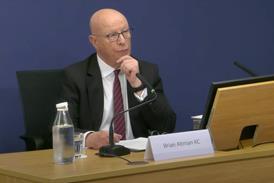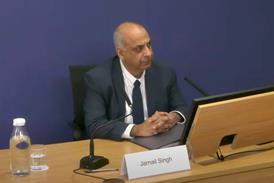The government should start an immediate court renovation plan to save dilapidated buildings where the total repair bill has now reached £1bn, according to an influential group of MPs.
A report by the justice committee published today says that temporary courtrooms should be used if necessary to allow existing court buildings to shut for essential works.
The maintenance backlog in the court estate is a serious problem, with far too many courtrooms frequently unavailable, with a knock-on effect on capacity and the functioning of the justice system, the report finds. At the same time, the numbers of judges, magistrates and court staff have dwindled – with staff roles often taken by contractors or agency staff.
Committee chair Sir Bob Neill MP said: ‘The physical estate has been left to crumble for too long and must be made fit for purpose. There must be sufficient numbers of judicial and clerical staff to cope with the volume of cases. The court system is creaking and there needs to be coherent, consistent planning to fix it.’
The report acknowledges that the introduction of Nightingale courts during the pandemic was successful but says that the backlog across criminal, family and county courts has reached critical levels. By the end of March, 58,818 cases were outstanding in the Crown court and 83,645 private family law cases in the family court.
Outgoing HM Courts & Tribunals Service chief executive Kevin Sadler told the committee that the overall maintenance backlog is now £1bn, exacerbated by needing to run heating and ventilation systems harder during Covid-19 restrictions.
The number of court and tribunal judges has dropped by 12% since 2012 while magistrate numbers have almost halved in that time. The number of HMCTS staff fell by 20% from 2010 to 2020, although the government has pledged funding for 1,600 extra staff.
The committee wants a new focus on plugging gaps in the judiciary and also recommends that HMCTS pay levels keep up with the rest of the civil service.
The report calls on the government to develop and deliver a comprehensive plan to improve the quality of the court estate over several years. It also recommends the establishment of a courts’ inspectorate.
On the £1bn digital upgrade of the courts, the committee notes this has been ‘beset by delays and criticism’ and the MoJ is urged to publish an update on progress made and in particular the expected completion date and expected final costs.
The Law Society said that unacceptable delays will continue across the justice system without sustained and significant investment. ‘This report shines a light on the shameful state of our justice system,’ said Society president I. Stephanie Boyce. ‘Decades of underfunding and cuts mean there simply aren’t enough judges, prosecutors defence lawyers and court staff left to cover the huge backlog of cases.’
The MoJ says it has cut the Crown court backlog by 2,000 since its peak in June 2021 and improved timeliness. It also points to the imminent recruitment of 1,000 judges across all jurisdictions and 4,000 magistrates.
A spokesperson added: ‘The committee rightly recognises that our decisive action kept justice moving during the pandemic and the Crown court backlog is now falling.
‘We have launched a recruitment drive for more judges and magistrates and spent more than £150 million over the past year on court building improvements to deliver the swift access to justice victims deserve.’
This article is now closed for comment.

























13 Readers' comments